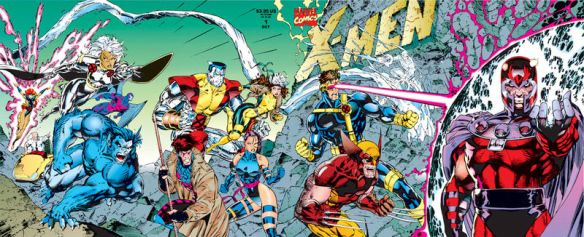In fantasy worlds where the whole population knows magic exists, but only some minority of people are magic users, things tend to go one of two ways. The first is that those with magic use their power to become something of a separate, usually higher, class, like the Aes Sedai in the Wheel of Time series. Even the Avatar universe implies that there’s at least social if not legal inequality between benders and non-benders. The other is that magic is criminalized, because how dare that threatening minority have the same freedoms as regular folk? As a story device, I don’t deny that this is believable; after all, the majority does tend to react with fear and suspicion toward those who are different. However, this concept is often used as an allegorical stand-in for other minorities who have historically been denied human rights, which doesn’t always work out narratively.
Consider the X-Men. Due to genetic differences, these characters have a wide array of different powers—telepathy, pyrokinesis, cryokinesis, healing factors, laser eyesight—that can effectively be called magical. The X-Men have also consistently been Marvel’s allegorical vehicle for discussions of civil rights for nearly half a century. The fight for mutant equal rights, the designation of the word “mutant” as a slur and the reclamation thereof, the split into factions that either want to work with the system to improve matters or want to violently overthrow said system; all of these echo real world civil rights struggles. One of the X-Men films even used mutant corrective therapy that echoed the so-called gay conversion therapy some conservatives still embrace.
And yes, many mutants are good people and there should be no reason to discriminate against them. Right? Well, the problem is, though, whether or not the X-Men are heroes or villains is irrelevant. The rest of humanity is justified in fearing them because, unlike real oppressed minorities, they have superhuman powers that can—and often do—threaten society. Furthermore, while there are certainly mutants who are also minorities (Storm, Kitty Pride, Magneto and his family, Jubilee), many of the most recognizable X-Men are cishet white men.
Holly Black’s Curse Workers series also uses the ability to do magic as a metaphor for oppressed people. Workers are people who can do magic with hand-on-skin contact, and so society has developed over the centuries so that everyone wears gloves. After centuries of their abilities being criminalized, however, many workers and worker allies think it’s time for the gloves to come off, literally. They lobby for the passage of laws decriminalizing curse work (which, despite its name, is value-neutral—it can have good or bad effects) and scoff at the gloves as a symbol of institutionalized mistrust. The characters who do support worker rights, powered and non-powered alike, even form together to create a school club similar to our own Gay-Straight Alliances.
The protests in the book explicitly resemble protests over LGBTQ+ rights, and the parallels are easy to draw—after all, queer people have also always been around, but we have only recently begun to demand that society treat us with the same cultural and legal respect with which it treats straight people. Except… far be it from me to reveal any Queer Secrets, but real queer people can’t magically affect your appearance, emotions, your luck, or anything else with a bit of skin on skin contact. While you do empathize with the series’s protagonist, who is a worker himself, when you follow the allegory to its obvious conclusion the situations are just not comparable.
In the end, magical people standing in for an oppressed minority kind of falls flat as a story device, because magical people do have the capacity to threaten the populace in a way that a Black teen or a transgender woman do not. Like, I don’t want to insult Magneto or anything, but I don’t think Laverne Cox can lift the Golden Gate Bridge with her mind.
Stories like this are interesting on their face, but ultimately suffer from a lack of believability. It’s one thing for real people to distrust minorities simply because they look different or love different from them. It’s harder to fault people for mistrusting people who can, whether or not they choose to, turn you into stone with a touch.
Follow Lady Geek Girl and Friends on Twitter, Tumblr, and Facebook!



